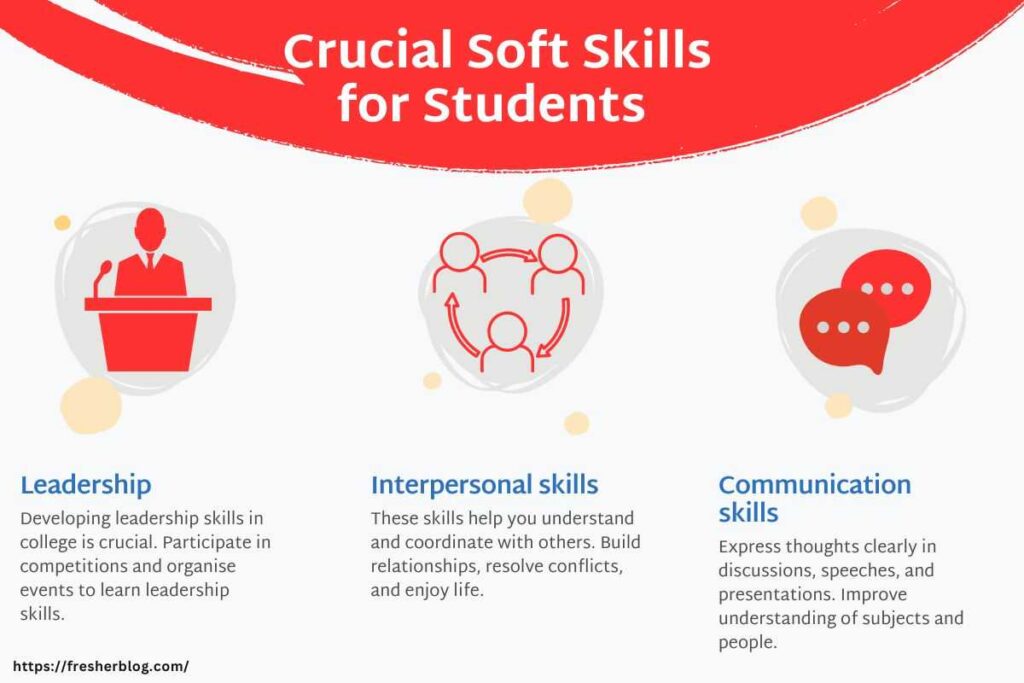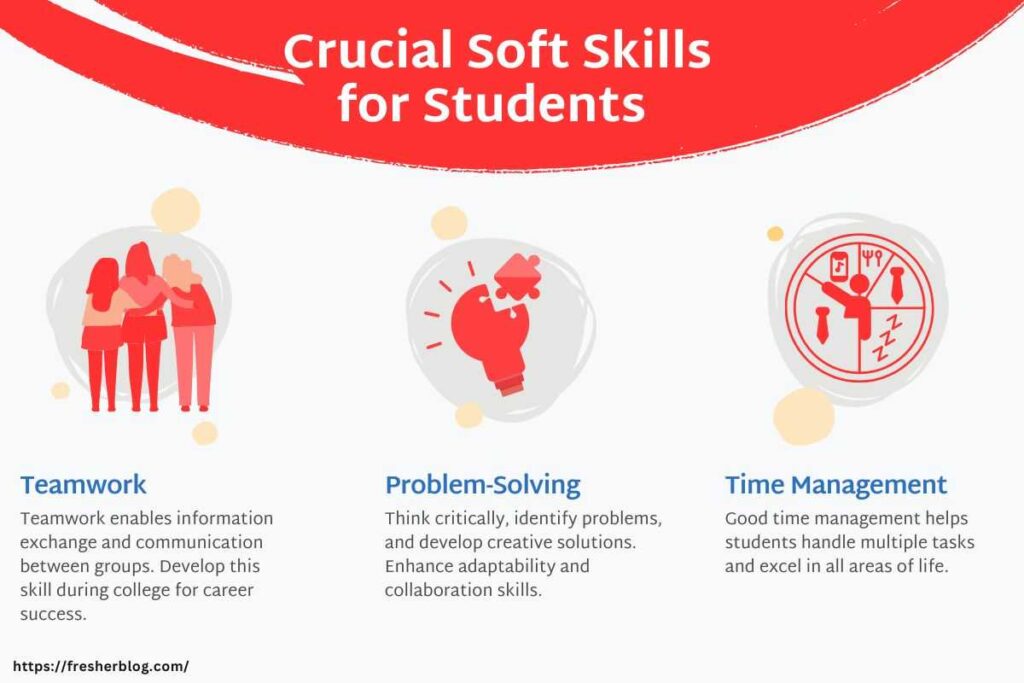
College Romance: The Teen’s Guide to Love and Friendship
February 24, 2024
Discover the Amazing Advantages of Swimming for College Students
March 9, 2024How to Develop the Best Students Soft Skills Now
Imagine you’re getting ready for a campus interview. You’ve done your homework and researched the company inside out. And then, out of the blue, the interviewer throws some questions at you:
Can you share when you had to deal with a challenging classmate?
How do you juggle multiple tasks with the same deadline?
What would you do if you disagreed with a faculty member?
Could you describe a time when you faced a failure in school and how you handled it?
How would you adapt if a project’s scope changed significantly right before the submission deadline?
These questions focus on critical soft skills for students to shine in the workplace. Skills like time management, adaptability, public speaking, effective communication, and many others are key to achieving career success and navigating academic life.
Interviewers often ask these questions to assess qualities that aren’t easily measured, like empathy, integrity, and work ethic. It’s a chance for you to showcase these valuable traits and make a lasting impression. Engaging in a variety of activities and experiences, such as internships, volunteering, and participation in extracurricular activities, helps students develop these soft skills in a real-life context.

What are the soft skills?
What are soft skills? They are essential character traits and interpersonal abilities crucial for success in both personal and professional environments.
Did you know that the U.S. Army coined the term “soft skills” in the late 1960s? It was a recognition of the importance of skills that go beyond machinery. These skills encompass various personal attributes, behaviours, and social attitudes that ultimately enhance our work and social interactions. These skills encompass various personal attributes, behaviours, and social attitudes, including essential personality traits that ultimately enhance our work and social interactions.
Consider social skills for effective leadership, soldier motivation, and even war success. Soft skills are significant in building healthy relationships, communicating with impact, problem-solving, and collaborating. They are intangible and subjective qualities that can’t be measured or quantified, yet they hold the power to transform individuals into true superheroes.


Understanding Soft Skills and Hard Skills
Why Are Soft Skills Important for Students?

Do soft skills matter for students? Let’s take a quick look at the top five reasons why soft skills for students matter:
Soft skills are not only crucial for employability but also play a significant role in achieving academic success by enhancing students’ ability to manage challenges and complex assignments.
Soft Skills Improve Employability
According to a survey by The Society for Human Resource Management, the skills employers value in applicants – dependability, integrity, communication skills, and adaptability – are primarily considered in demand soft skills.
Soft Skills Predict Success, Even in High-Tech Environments
Strongness in Maths and Sciences may not be enough to succeed in tech companies. A study by Google found a correlation between soft skills and long-term performance. These findings underscore the importance of soft skills in achieving professional success, as they are key predictors of long-term performance and career growth. Google’s hiring, firing, and promotion data analysis revealed that communication skills, critical thinking, and emotional intelligence are key predictors. Coaching skills, listening ability, and empathy also matter.
Adaptability Ensures Survival in the Modern Workplace
The workplace is rapidly evolving, and adaptability is crucial for keeping up. As roles become more complex with less learning time, students must learn to manage workloads, juggle commitments, and work effectively to produce quality results.
Good Interpersonal Skills, Great Leaders
Building solid relationships with clients, customers, and stakeholders is valuable. Developing strong people skills is essential for building solid relationships and excelling in leadership roles. Soft skills set employees apart for leadership roles. The ability to relate to others determines success in leading a team, and responsiveness and empathy towards clients signal a commitment to resolving issues.
Soft Skills Allow Your Hard Skills to Shine
Even with technical skills, a balance of hard and soft skills is crucial for success. Collaboration, coordination, and relating to others make you more effective.
Strong communication skills among employees are crucial for the company to maximise the knowledge and expertise available. Soft skills enable people to collaborate effectively on projects, brainstorm and negotiate, and gather support while encouraging participation from others. Let’s work together to foster a friendly and collaborative environment!
Ways to enhance your soft skills while in college?

It’s fantastic that you’re considering boosting your soft skills in college! Team assignments and club activities are wonderful ways to help students enhance these skills. One thing to tackle in team assignments is ensuring everyone pulls their weight and resolves conflicts. You could try volunteering as the team lead to take on these challenges. Regular check-ins can help address any issues and support your teammates. The same principles apply to club activities, where organizing events can give you valuable experience. Mentoring and tutoring others is a great way to develop empathy and problem-solving skills. You’ll be even better prepared for the professional world after college by actively getting involved in these opportunities.
Crucial Soft Skills for Students to Prepare for the Future

There are so many incredible and important soft skills that you can develop over time, whether you’re at college, at home, or within your society. It is essential to choose a few that resonate with you and give them a shot. Here are some essential ones to consider: –
Leadership: Leaders act, offer guidance, inspire others, and solve problems. Developing leadership skills in college is crucial. Participate in competitions and organise events to learn leadership skills.
Interpersonal skills: Students with excellent interpersonal skills become exceptional corporate resources. These skills help you understand and coordinate with others. Build relationships, resolve conflicts, and enjoy life.
Communication skills: Strong communication skills lead to success in academics and profession. Express thoughts clearly in discussions, speeches, and presentations. Improve understanding of subjects and people.
Teamwork: Teamwork enables information exchange and communication between groups. Develop this skill during college for career success.
Problem-Solving: Problem-solving skills are valuable throughout student life. Think critically, identify problems, and develop creative solutions. Enhance adaptability and collaboration skills.
Time Management: Good time management helps students handle multiple tasks and excel in all areas of life.
How to Develop Soft Skills as a Student

Soft skills, such as communication, teamwork, problem-solving, and adaptability, can be cultivated through deliberate practice and experiences. Seeking constructive feedback from peers, mentors, and instructors can provide valuable insights into your strengths and areas for improvement. Here’s a guide on how students can develop these vital skills:
1. Practice Effective Communication
Engage in Active Listening: Focus on truly understanding what others are saying by listening without interrupting and asking clarifying questions to communicate effectively. This helps in improving both verbal and non-verbal communication.
Join Public Speaking Groups: Participating in clubs like Toastmasters or debate teams can help improve public speaking and boost confidence in expressing ideas clearly.
Write Regularly: Improve written communication by keeping a journal, starting a blog, or engaging in essay writing. The more you write, the better you get at articulating your thoughts.
2. Enhance Teamwork and Collaboration
Participate in Group Projects: Take an active role in school or college group assignments. These projects teach you how to work with others, share responsibilities, and handle conflicts.
Volunteer for Team-Based Activities: Join clubs, sports teams, or volunteer organizations where you need to work closely and interact effectively with others. This will help you learn to collaborate, delegate tasks, and appreciate diverse viewpoints.
Take Leadership Roles: Even in small tasks, stepping up as a leader helps you understand group dynamics and improve your ability to motivate and manage a team.
3. Develop Problem-Solving and Critical Thinking Skills
Engage in Critical Thinking Exercises: Engage in critical thinking exercises to develop solutions, solve puzzles, play strategic games like chess, or engage in discussions that require logical reasoning. These activities help sharpen your problem-solving skills.
Reflect on Challenges: When faced with a problem, take time to analyze what worked and what didn’t. Reflecting on your experiences helps improve your decision-making abilities.
Seek Feedback: Ask teachers, peers, or mentors for feedback on how you approach problems. Constructive criticism can provide valuable insights into how you can enhance your critical thinking skills.
4. Improve Time Management
Use a Planner: Organize your tasks and set deadlines using a physical planner or digital apps to prioritize tasks and manage your time more effectively. Prioritize your tasks by importance and deadlines to manage your time more effectively.
Set SMART Goals: Create Specific, Measurable, Achievable, Relevant, and Time-bound goals. Breaking tasks into smaller, manageable steps helps in maintaining focus and tracking progress.
Avoid Multitasking: Focus on one task at a time to complete it efficiently and with higher quality. Multitasking can reduce productivity and increase stress.
5. Cultivate Adaptability
Embrace Change: Be open to new ideas, experiences, and ways of doing things, as adaptability often involves solving problems and stepping out of your comfort zone. Embrace challenges as opportunities for growth.
Learn Continuously: Stay curious and keep learning new skills or subjects. The more you know, the more flexible you become in adapting to different situations.
Practice Resilience: Develop a positive mindset towards setbacks. When things don’t go as planned, view them as learning experiences and move forward with renewed energy.
6. Build Emotional Intelligence
Increase Self-Awareness: Reflect on your emotions and how they influence your behavior. Journaling or mindfulness exercises can help you become more attuned to your feelings.
Practice Empathy: Put yourself in others’ shoes to understand their perspectives. Engaging in meaningful conversations and showing genuine interest in others’ well-being enhances empathy. Additionally, interpreting non-verbal cues can provide deeper insights into others’ emotions and intentions, enhancing your emotional intelligence.
Manage Stress Effectively: Use techniques like deep breathing, exercise, or meditation to keep stress levels in check. Managing stress is key to maintaining emotional balance and effective interpersonal interactions.
Developing Soft Skills Through Academics
Academic institutions play a significant role in helping students develop essential soft skills, such as communication, teamwork, and problem-solving. Group projects and discussions are effective ways to develop these skills, as they encourage collaboration, active listening, and critical thinking.
Academic programs that incorporate soft skills development, such as leadership skills, time management, and self-awareness, can help students prepare for professional life. Developing soft skills through academics can enhance students’ academic performance, improve their relationships with peers and instructors, and increase their confidence.
Soft skills development can also be integrated into curricula through service-learning projects, internships, and capstone courses. By prioritizing soft skills development, academic institutions can help students become more well-rounded, adaptable, and competitive in the job market.
Developing soft skills can also help students navigate higher education, build meaningful relationships, and make informed decisions. Academic advisors and instructors can play a crucial role in guiding students to develop essential soft skills, such as problem-solving, critical thinking, and effective communication.
Soft skills development can be assessed and evaluated through various methods, including feedback sessions, self-reflection, and peer evaluations. By emphasizing soft skills development, academic institutions can help students achieve success in their academic and professional pursuits.
Group Projects
Group projects are an effective way to develop essential soft skills, such as communication, teamwork, and problem-solving. Working in groups encourages students to practice active listening, critical thinking, and collaboration. These projects can help students develop leadership skills, time management, and self-awareness as they work together to achieve a common goal.
Group projects can be used in various academic settings, including business, engineering, and humanities. By working in groups, students can develop valuable soft skills, such as conflict resolution, negotiation, and decision-making. Group projects can also help students build positive relationships, develop a sense of responsibility, and enhance their overall academic performance.
Instructors can facilitate group projects by providing guidance, feedback, and support, and by encouraging students to reflect on their experiences. Group projects can be assessed and evaluated through various methods, including peer evaluations, self-assessments, and final project presentations. By incorporating group projects into academic curricula, instructors can help students develop essential soft skills, such as communication, teamwork, and problem-solving.
Active Listening
Active listening is a critical soft skill that involves fully concentrating on and comprehending the message being conveyed. It is essential for effective communication, conflict resolution, and building strong relationships. By practicing active listening, individuals can develop a deeper understanding of others, improve their communication skills, and enhance their overall relationships.
Active listening involves maintaining eye contact, avoiding interruptions, and asking clarifying questions. It can be developed through practice, feedback, and self-reflection, and is essential for personal and professional growth. Instructors can teach active listening skills by modeling them in the classroom, providing feedback, and encouraging students to practice active listening in group discussions.
Active listening is a valuable soft skill that can be applied in various settings, including academic, professional, and personal relationships. By developing active listening skills, individuals can become more empathetic, improve their communication skills, and build stronger relationships. Active listening can also help individuals resolve conflicts effectively, make informed decisions, and develop a positive attitude.
By prioritizing active listening, individuals can enhance their overall communication skills, build stronger relationships, and achieve greater success in their personal and professional lives.
Where should you emphasize soft skills?

When you’re putting together your application materials, like resumes, cover letters, and job applications, it’s super important to highlight soft skills. Don’t forget to back up your claims with examples, especially in your cover letter. When crafting your resume, pick and emphasise two or three critical soft skills that match the job you’re applying for. This approach will level up the quality of your application and make a real impact.
Develop and hone your soft skills through practice
College is such an exciting time! Congratulations on your journey to understanding the value of soft skills for students! You likely have a unique opportunity to hone these skills in various settings through group projects, campus organizations, or even part-time work. Engaging in continuous professional development through workshops, seminars, and networking can further enhance your soft skills and career potential. But it’s not enough to understand their importance – you must also know which ones are most crucial for your future career. Take some time to research job descriptions related to your desired field and note the required soft skills. Then, find ways to incorporate these skills into your daily routine. This will help you become a well-rounded and effective professional and show potential employers that you have the dedication and determination to succeed in any role. So, keep practising those soft skills, and watch as your career potential skyrockets!




